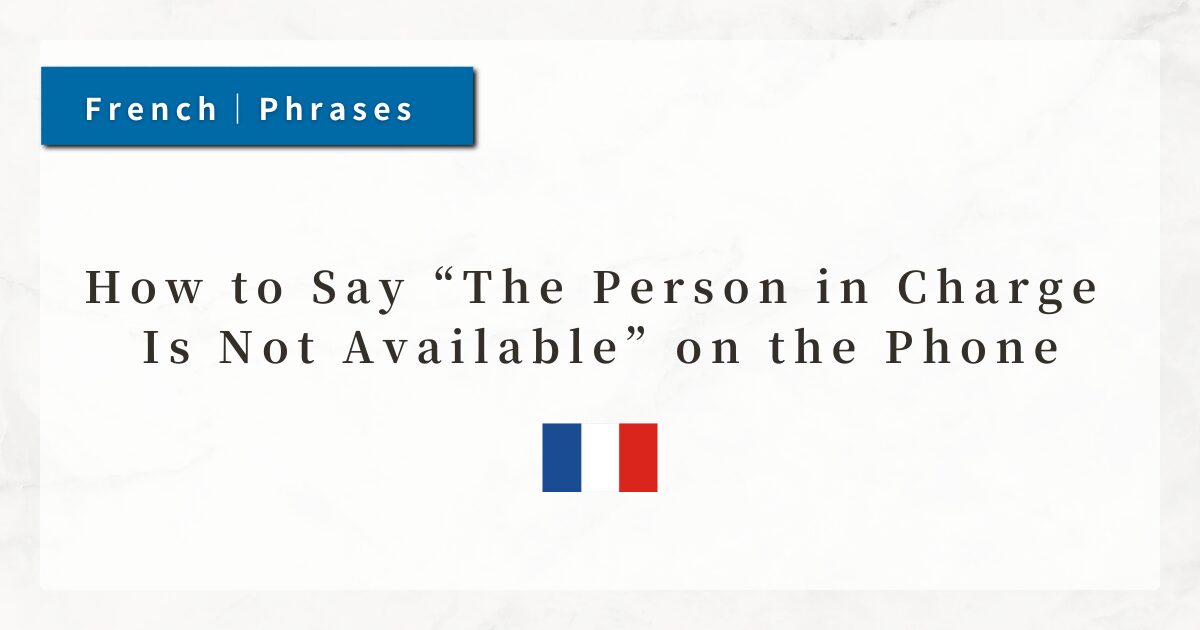#71 How to Say “The Person in Charge Is Not Available” on the Phone|French for Business Calls

In business settings, when answering the phone, you may need to inform the caller that the person in charge is unavailable.
In French, memorizing a few short expressions will allow you to explain the situation politely and accurately.
In this lesson, I will explain the basic French expressions used to say that someone is unavailable on the phone, along with related useful phrases.
Dialogue

Bonjour, puis-je parler à Monsieur Martin, s’il vous plaît ?
(Hello, may I speak with Mr. Martin, please?)

Bonjour, je suis désolé, mais il n’est pas disponible en ce moment.
(Hello, I’m sorry, but he is not available at the moment.)

Savez-vous quand il sera disponible ?
(Do you know when he will be available?)

Il sera de retour cet après-midi. Voulez-vous laisser un message ?
(He will be back this afternoon. Would you like to leave a message?)

Oui, merci. Pouvez-vous lui dire qu’il m’appelle ?
(Yes, thank you. Could you tell him to call me back?)
1. Basic Expressions for “Not Available”
The most common phrase to say “He/She is not available” is:
- Il n’est pas disponible en ce moment.
(He is not available at the moment.)
Here, disponible means “available” and is used in the same way as in English.
- Il est absent.
(He is absent / away.) - Elle est en réunion.
(She is in a meeting.) - Il est sorti.
(He has gone out.)
Giving a specific reason such as “in a meeting” or “out of the office” helps the caller understand the situation better.
2. Expressions for Indicating Return Time
It is common for the caller to ask when the person will be back. To answer, use “être de retour” (to be back).
- Il sera de retour cet après-midi.
(He will be back this afternoon.) - Elle revient demain matin.
(She will return tomorrow morning.)
You can use the simple future (sera de retour) or the near future (il va revenir bientôt) depending on the context.
3. Taking or Requesting a Message
If the person in charge is unavailable, you may need to take a message or ask for a callback.
- Voulez-vous laisser un message ?
(Would you like to leave a message?)
Caller’s possible responses:
- Pouvez-vous lui dire qu’il m’appelle ?
(Could you tell him to call me back?) - Pouvez-vous lui transmettre ce message ?
(Could you pass this message on to him/her?)
Here, lui means “to him/her,” referring to the person in charge. It is an essential pronoun in telephone exchanges.
4. Polite Expressions for Telephone Calls
To sound more polite in phone conversations, add phrases at the beginning or end such as:
- Je suis désolé(e).
(I’m sorry.) - S’il vous plaît.
(Please.)
Even short phrases can make the conversation smoother and show courtesy to the caller.
Summary
- n’est pas disponible
→ standard way to say “unavailable.” - être de retour
→ “to be back,” used to indicate return time. - Voulez-vous laisser un message ?
→ polite way to offer taking a message. - Pouvez-vous lui dire … ?
→ request for leaving a callback message.




